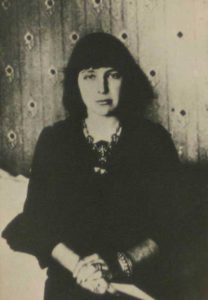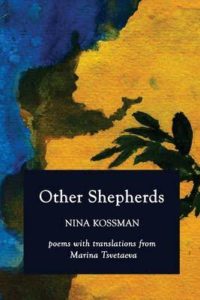
Kossman at the Tsvetaeva Museum in Moscow.
Twenty years ago, critic Harold Bloom wrote to the young poet Nina Kossman to tell her that her “intensely eloquent” translations of the poet Marina Tsvetaeva manage to “capture the doom-eager splendor of a superbly gifted poet.” W.S. Merwin wrote that these are “direct, strong, audible translations,” adding, “I hear Tsvetaeva’s voice, more of it, and in a new pitch, which makes something clear in her poems that I had only guessed at before.”
Her most recent collection, Other Shepherds, was published earlier this year by Poets & Traitors Press. Kossman’s collection pairs about a hundred poems, half by Tsvetaeva and half by her fellow Muscovite translator. Kossman pairs them “not in competition but with humility,” making of this doubling a new kind of conversation. As she writes in the Preface, “The aim is not to emulate her but to create a dialogue between her poem and mine, a resonance possible not only between two poets but between two eras. My goal is not to aspire to her heights, which are unscalable, as they are hers and no one else’s, but to approach her and to speak.”
As for the title, she writes: “Other Shepherds comes from my translation of Tsvetaeva’s poem which ends with, “There is an island—thank God!— / Where I don’t need a tambourine, / Where black wool/ Hangs from every fence. Yes / —There are in the world black flocks, / Other shepherds.” (1920).”
“Although the poem’s protagonist is addressing a lover, I took the last line slightly out of its amorous context and used it in a broader sense, in a kind of social, or rather, existential sense,” she explains. “I don’t believe that I have sinned against the poet by looking at her poem this way; in fact, I think the poem is quite amenable to this interpretation, especially if we look at the ending of the penultimate stanza. ‘In your flock there was no / Sheep blacker than I’ which resonates far beyond the personal context of a rejected woman speaking to her lover.”

A “black sheep,” for sure.
Nina Kossman was born in “the same Communist dystopia that, a few decades before my birth, led Marina Tsvetaeva to commit suicide by hanging.” She writes that it was a place where “‘being different,’ an uncomfortable feeling in any society at any time, led to much more than the usual social ostracism; where comrades were clearly divided into ‘white sheep’ and ‘black sheep,’ and where the black sheep didn’t end up very well.”
“Since I left the Soviet Union as a child, my experience of ‘black-sheep-ness’ was somewhat limited, but I have been very aware of my parents’ experience, particularly that of my mother—a Jew, a daughter of an ‘enemy of the people,’ a student of genetics in the era of Lysenko (the official Soviet biologist who rejected genetics), and thus thrice an outsider in the society that didn’t tolerate outsiders,” she explains.
 “The title has another meaning too. Having lived in two so- called ‘superpowers,’ i.e. having spent my childhood in the Soviet Union, where personal freedoms were curtailed, and my youth and adulthood in ‘something of its opposite’ (my way of referring to the US as a teenager) with its seemingly unlimited personal freedoms, I found both wanting. Being a ‘black sheep’ in the Soviet Union was not only painful psychologically. It pushed you to the edge of a very real abyss, since a threat of physical extermination was real. In the US, being a black sheep in a herd, a society where outsiders are accepted, yields only psychological pain. And so an immigrant from the former Soviet Union swings between these two. These are two very different kinds of ‘black-sheep-ness,’ one hard core and the other soft. The black sheep consciousness continues in the so-called free world, attenuated, without the attendant fear of physical extermination.”
“The title has another meaning too. Having lived in two so- called ‘superpowers,’ i.e. having spent my childhood in the Soviet Union, where personal freedoms were curtailed, and my youth and adulthood in ‘something of its opposite’ (my way of referring to the US as a teenager) with its seemingly unlimited personal freedoms, I found both wanting. Being a ‘black sheep’ in the Soviet Union was not only painful psychologically. It pushed you to the edge of a very real abyss, since a threat of physical extermination was real. In the US, being a black sheep in a herd, a society where outsiders are accepted, yields only psychological pain. And so an immigrant from the former Soviet Union swings between these two. These are two very different kinds of ‘black-sheep-ness,’ one hard core and the other soft. The black sheep consciousness continues in the so-called free world, attenuated, without the attendant fear of physical extermination.”
Do her poem pairings do the job? See a sample of the pairings below:

Tags: Harold Bloom, Marina Tsvetaeva, Nina Kossman, W.S. Merwin

